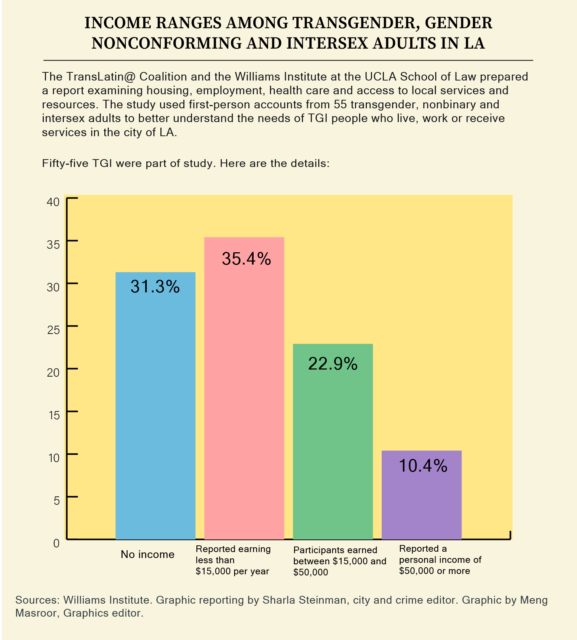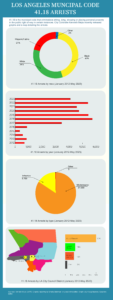UCLA’s Williams Institute released a report on the overall quality of life of transgender, gender non-conforming and intersex adults in Los Angeles in November.
The report, “From Surviving to Thriving: A Quality-of-Life Study with Transgender, Gender Nonconforming, and Intersex (TGI) Adults in the City of Los Angeles,” was prepared for the city of LA by the Williams Institute and the Translatin@ Coalition, an LA-based organization committed to addressing the needs of trans Latinx immigrants across the United States.
Miguel Fuentes, one of the study’s authors and a research and data analyst at the Williams Institute, described the report as having both identified the challenges for LA’s TGI population, as well as effective solutions.
“What the study finds is that there are challenges all over the place for the quality of life of transgender, nonconforming and intersex populations in the city,” Fuentes said. “We found all those challenges around housing, employment, security. We also have this other side that we found, which is there’s still resiliency among these communities, and we have something there that we can work with to improve the TGI community’s lives.”
The report used data from 55 first-hand accounts and examined topics such as housing, employment, healthcare, and access to local services to find deficiencies and make policy recommendations.
The report included findings on barriers to employment that led to high rates of unemployment – 55.3% of participants were not employed – and to subsequent financial difficulties, as nearly a third of participants reported having no income, and only 1 in 10 had an income greater than $50,000 per year.
Bamby Salcedo, one of the study’s authors and the President of the Translatin@ Coalition, emphasized the poverty faced by TGI adults.
“One of (the issues) brought up is that a third of the participants reported that they were making less than $15,000,” Salcedo said. “This tells us that trans people continue to be the most poor of any other populations.”
Housing was the area in which participants reported encountering the greatest challenges, including assumptions about their ability to pay rent or the source of their income due to their gender identity. According to the report, many participants also said they felt unsafe in homeless shelters.
Kerith Conron, one of the study’s authors and research director at the Williams Institute affirmed that better shelter is needed for TGI adults.
“We know emergency shelters are inadequate,” Conron said. “The census conducted of homeless people by the city of LA itself found that transgender people were overrepresented among those who are unsheltered. So we know that we need more emergency shelters that are doing a good job by trans people and keeping them safe.”
Many participants in the study also said they experienced difficulty accessing adequate healthcare from professionals who understood the needs of TGI adults. Issues of access were exacerbated in participants who did not speak English as a first language.
Salcedo said the study confirmed much of what the Translatin@ Coalition has known for years about the safety concerns and the lack of housing and employment opportunities, among other issues, for TGI adults in LA.
“I would say this is affirming what we already knew. And so this was an opportunity for us to put it down and share with people – our methodology, our process of how we went about collecting this data, and really putting down what people share with us.”
The report included specific policy recommendations, such as increasing access to homeless shelters that are safe for TGI adults, training law enforcement to protect TGI community members walking in public streets or using public transport and broadly funding TGI-led organizations that are best equipped to meet the needs of the community.
Fuentes said he is hopeful that the report will act as a starting point for future policy.
“I’m very excited about these kinds of projects because these ideas can definitely have policy implications,” Fuentes said. “It’s the voices of the transgender nonconforming intersex populations of the city that we’re trying to expand and replicate around the city, so the policy recommendations that we came up with are coming from the needs and the challenges that they are voicing.”






Comments are closed.